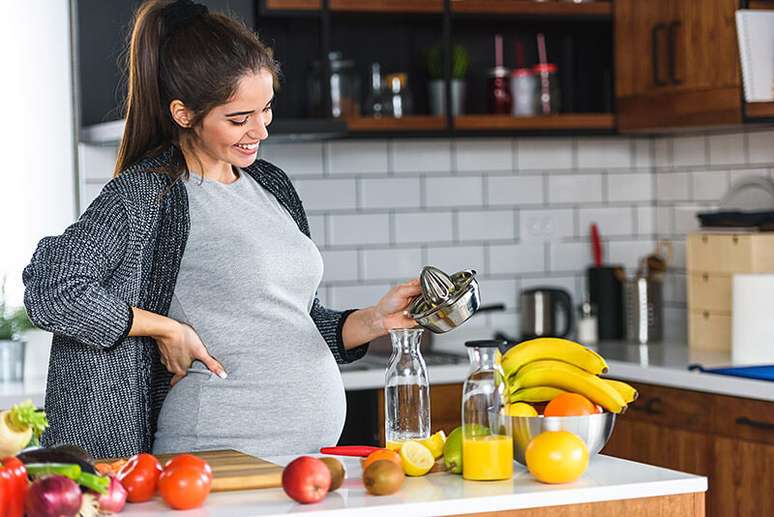Preconception and early pregnancy diet may be associated with reduced risk of miscarriage, study finds
html[data-range=”xlarge”] figure figure img.img-993858fc9b741095d758ee19f6ee612f1lz2r6o9 { width: 774px; height: 517px; }HTML[data-range=”large”] figure image img.img-993858fc9b741095d758ee19f6ee612f1lz2r6o9 { width: 548px; height: 366px; }HTML[data-range=”small”] image figure img.img-993858fc9b741095d758ee19f6ee612f1lz2r6o9, html[data-range=”medium”] figure image img.img-993858fc9b741095d758ee19f6ee612f1lz2r6o9 { width: 564px; height: 376px; }
With physical and emotional health risks, miscarriages constitute one of the saddest and most sensitive moments in a woman’s life. But a recent review found that a preconception and early pregnancy diet containing lots of fruits, vegetables, seafood, dairy products, eggs and grains may be associated with a reduced risk of miscarriage.
“Researchers analyzed 20 studies that explored the dietary habits of women who gave birth in the months before and shortly after conceiving a child to see if these studies showed evidence of an association with a lower or higher likelihood of miscarriage. More fruits and vegetables made the list,” explains Fernando Prado, specialist in human reproduction, Fellow of the American Society of Reproductive Medicine (ASRM) and clinical director of NeoLife.
“These are foods that normally constitute ‘healthy’ and balanced diets, with previous evidence showing that it is important to eat a complete diet rich in protein, vitamins and minerals during pregnancy,” adds nutritionist Marcella Garcez, director and professor at the Brazilian Association of Nutrology (ABRAN).
The poll was published in the magazine in early April Fertility and sterility.
Miscarriages are more common than one might think.
Miscarriages are very common, more than you might think, experts say. “It is estimated that 15 to 25% of all pregnancies can end in miscarriage,” says Fernando.
The research review found that, compared with low fruit intake, high fruit intake may be associated with a 61 percent reduction in the risk of miscarriage.
“High intake of vegetables may be associated with a 41 percent reduction in risk of miscarriage, the study found. For dairy products, this is a 37 percent reduction, 33 percent for grains, 19 percent for seafood and eggs,” explains Marcella.
The researchers also examined whether pre-set diet types, such as the Mediterranean diet or the fertility diet, might also be linked to miscarriage risk. They could find no evidence that following any of these diets reduced or increased the risk.
“However, a whole diet containing generally healthy foods, or foods rich in antioxidant sources and low in pro-inflammatory foods or unhealthy food groups may be associated with a reduced risk of miscarriage for women,” says the nutritionist study.
Processed foods, for a change, are terrible for pregnancy
Fernando Prado recalls that a diet rich in processed foods was associated with a doubling of the risk of miscarriage. The studies included in the analysis focused on the periconceptional period, a period before and during the first 3 months of pregnancy.
Data collected from a total of 63,838 healthy women of reproductive age were included, with information about their diets typically collected using food frequency questionnaires for each study.
“Nearly 50% of early pregnancy losses remain unexplained, and in the absence of a cause, parents often turn to their health care providers for guidance on the best ways to be as healthy as possible and reduce the risk of future miscarriages. There is a growing body of evidence showing that lifestyle changes — including dietary changes, quitting smoking and not drinking alcohol — before conception and in the early stages of pregnancy — can have an impact.”
The doctor says she strongly encourages couples to consider the importance of making positive lifestyle choices when planning a family and sticking to those healthy choices throughout pregnancy and beyond.
“Knowing that positive lifestyle choices can make a significant difference in reducing the risk of miscarriage, couples can feel empowered to take care of their own health and the health of their baby,” adds the doctor.
A healthy diet is important during pregnancy
According to the nutritionist, diet advice is one of the topics that should be talked about the most when it comes to pregnancy.
“Eating a healthy diet, taking supplements like folic acid and omega 3s, exercising, and trying to reduce stress are things people can try to do to reduce their risk of miscarriage,” adds the doctor.
The reproductive physician says that miscarriages should always be treated with care.
“In case of recurrence, specific treatment must be sought. The assisted reproduction professional will be able to help the couple by identifying the causes. Once the cause has been discovered, treatment can be started and performed in different ways, depending on the needs of each patient. Depending on the causes of the recurring miscarriage, a change in habits may be recommended, but it may also be necessary to perform IVF (In Vitro Fertilization) so that the woman is able to get pregnant again – and the technique can help to chromosomally select normal embryos. The pregnancy must be closely monitored by a team of specialists, ”she stresses.
The good news is that regardless of the causes of the recurrent miscarriage, women who have gone through this situation have a 70% chance of getting pregnant and having a healthy pregnancy. “The best thing to do is to look for a specialist,” concludes Fernando.
HOMEWORK inspires transformation in the world of work, in business, in society. Created by Compasso, a content and connection agency.
Source: Terra
Ben Stock is a lifestyle journalist and author at Gossipify. He writes about topics such as health, wellness, travel, food and home decor. He provides practical advice and inspiration to improve well-being, keeps readers up to date with latest lifestyle news and trends, known for his engaging writing style, in-depth analysis and unique perspectives.








